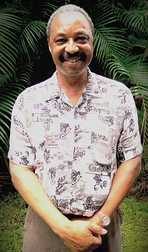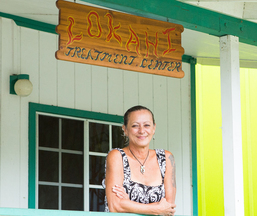
This was the beginning in 2001 of the Waikoloa Community-Based Substance Abuse Rehabilitation and Recovery Program, which eventually became simply the Lokahi Treatment Centers (LTC).
“I started at the Waikoloa Community Church. They gave me permission to use their annex building. I was retired and didn't need a salary so I was basically doing it for free,” says Wasan.
The roots of Wasan’s compassionate approach are drawn from his own life experiences. After serving in Vietnam with the Marine Corp and being wounded twice, he was honorably discharged in 1968. Like many who have served, civilian life was difficult and he became addicted to pain medication.
“I struggled to get myself off of that and I ended up going to night school at San Diego College and got past that addiction,” says Wasan.
Eventually he re-entered military life with the Air Force and continued his education with a B.A. in history and master’s degrees in Public Administration and Clinical Psychology. When he retired from the Air Force he came to Hawaii and obtained a Ph.D. in Health Psychology while working with PTSD patients at the Veterans Hospital on Oahu.
He believes that mental health issues should not be criminalized. “I really don't think people should be going to jail. They should be going to treatment,” says Wasan. He has created an integrated, holistic model of treatment for an array of mental health issues and has opened offices in Waikoloa, Kohala, Honokaa, Hilo, Kona and Puna.
“The ultimate goal is to help those in emotional pain find relief from their suffering and realize their ability to accomplish miracles,” he adds.

“When they folded, Dr. Wasan called me back and asked if I could handle this Kohala office. I said ‘of course’ because I like helping people with addiction,” says Chartrand. “I'm in recovery for almost 19 years now and what started it was me getting that help and being able to see life differently. I chose to do the same thing for other people and that's been my journey,” she adds.
Prior to coming to Kohala, which she has made her home, Chartrand, a certified substance abuse counselor (CSAC), worked for various BISAC offices but she made a connection with Kohala through her work at the Waimea office. “That's how I became familiar with the Kohala community because I was working with a lot of Kohala people coming to the Waimea BISAC office,” says Chartrand.
Along with mentoring from Wasan, Chartrand gained key experiences in Waimea that have deepened her practice and helped her connect with the Kohala community. “Aunty Ulu (Garmon) mentored me when I was at BISAC and she showed me some of the things I could use with the clients that would help them. Just yesterday we did the lokahi wheel, identifying what my needs are and how I'm going to get those needs met,” says Chartrand.
While in Waimea, Chartrand also developed a working relationship with Hawaiian cultural practitioner Nani Svendsen. “I got to know her throughout the years and work with her down at Loʽi Kukui [Keaukea, Kohala]. It prepared me to come here,” says Chartrand, who combines a cultural/spiritual component with education and cognitive behavioral therapy.
The LTCs use a variety of approaches in group and individual sessions and one technique that Chartrand has found particularly effective is cognitive behavioral therapy. “I can educate them about what drugs and alcohol do to a body, but it comes down to life skills, things that happen in their lives and all the consequences [of substance abuse]. You can teach them this is how you can look at life,” says Chartrand.
But a key aspect of treatment at the Kohala LTC is the re-connection with Hawaiian cultural practices, which are integrated into the counseling. “E ho mai represents asking for the wisdom, the knowledge, and so that's what we do before we start anything, asking the ancestors to allow me to open up my ears so I can receive the messages that we're going to learn in class today,” Chartrand says.
There is a group session at the loʽi [kalo field] once a week where clients can engage in spiritual healing. “That's where we address core issues,” says Chartrand. “Going into the loi, getting your feet dirty, being able to get connected with the land, the heavens, it helps the healing process. You plant the kalo. You're planting a new life into your heart. You have to make sure the soil is all good and you have to pull out all the weeds, things that are stuck inside you. The spiritual side helps them stay clean and sober,” Chartrand adds.
Along with weekly group sessions, Chartrand provides individual therapy sessions. “I sit down with them and we talk. I can hear and see in between the lines of what they say. It's almost like doing Hoʽoponopono (traditional Hawaiian practice for mental cleansing and forgiveness) with them. Taking that onion and stripping down the layers one by one. Getting them to be trusting and comfortable,” says Chartrand. “It's a journey but I'm not going to give up. I moved here [Kohala] and I'm here to stay,” she adds.
Our Hawaiʽi Island canoe has gained valuable crew members in Verna Chartrand and Dr. Wasan, who through hard work and compassion have inspired many others who are working every day to bring lokahi and healing to the communities they serve.
 RSS Feed
RSS Feed
